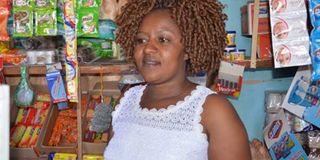Woman narrates of her successful battle with Leukaemia

Ms Alice Wangari in her kiosk in Ndagani market near Chuka University, Tharaka-Nithi County. She narrated to the Nation her successful battle with Leukaemia. PHOTO | ALEX NJERU | NATION MEDIA GROUP
What you need to know:
- She had persistent a headache and as the days went on she had to hire a motorbike to and from the house.
- Rigorous examination at Aga Khan Hospital in Nairobi revealed that she was suffering from a blood cancer, also known as Leukaemia.
- In India where she received treatment for one and half months, she had to pay Sh2.5 million, an amount that could not be easily raised.
- After one and half months intensive treatment Wangari was free from the cancer.
The charming smile on Alice Wangari’s face betrays the reality of her life few months ago.
In the busy Ndagani market in the outskirts of Chuka Town, Ms Wangari is among the few business people providing food to more than 15,000 Chuka University students and other locals.
In her small kiosk, the 36-year-old mother of two sells snacks and drinks which are mainly bought by students and boda boda riders.
In March 2014, Ms Wangari’s body developed some complications which forced her to move from one hospital to another seeking for treatment.
The young mother suspected that something was wrong with her health after she could hardly walk from her house to the kiosk which is around 300 metres away.
She felt exhausted, fatigued and nose-bled.
PERSISTENT HEADACHE
She had persistent a headache and as the days went on she had to hire a motorbike to and from the house.
This continued for weeks before she decided to visit a private hospital in Chuka which diagnosed her with pneumonia but her health continued to deteriorate.
She went to another hospital in Embu where she was diagnosed with stomach ulcers and was admitted for three weeks. But life was no better.
Rigorous examination at Aga Khan Hospital in Nairobi revealed that she was suffering from a blood cancer, also known as Leukaemia.
With the bad news of the terminal disease, Ms Wangari lost hope and she was only left to count her days on earth.
Likewise, her family got the news with a big shock. But her husband, Franklin Micheni, remained hopeful and urged her to be optimistic and prayerful.
The advice was not easily taken as Wangari was unaware of cancer patients successfully who healed.
To commence her treatment at Aga Khan, she had to pay Sh1.5 million, an amount that her family could not raise.

Ms Alice Wangari on her hospital bed in India where she went for treatment. PHOTO | ALEX NJERU | NATION MEDIA GROUP
TWENTY BLOOD DONORS
She was also required to provide 20 blood donors per week to have enough blood for transfusion, something that consequently reduced her chances of survival.
As she continued to negotiate for her treatment she decided to transfer to Rajiv Gandhi Cancer and Research Institute in India.
Her family had to sell everything to raise money for her air ticket and consultation fee at the hospital.
In India where she received treatment for one and half months, she had to pay Sh2.5 million, an amount that could not be easily raised.
The family members sold the remaining properties and also called friends and relatives who raised the remaining amount.
In the ward, Ms Wangari was nicknamed prayer warrior due to her relentless efforts to pray for 20 others.
“I was nicknamed prayer warrior in the ward because I used to pray after every 30 minutes for one and half months that I was admitted there,” said Ms Wangari.
“Seven people died as I watched, but I asked God to heal me to live as a testimony of his power to the people,” says Ms Wangari.
INTENSIVE TREATMENT
After one and half months intensive treatment Wangari was free from the cancer.
She could not believe this even after several tests.
Back home, neighbours and friends shunned her as they thought she was sent home after unsuccessful treatment.
“My emaciated body was enough message to my friends and neighbours that I was nearer to the grave than when I left.
“Those whom I owed some money started sending me messages demanding for pay before I die,” she said.
The poor woman was left with her God and her husband and two kids who nursed her with energy giving foods.
In church, Wangari continued to give testimonies of her healing miracle and now praying for the sick.
“Out of my hospital bed I came out as an intervener and I now pray for the sick in my church and the community,” she says.
Back in her small kiosk, Wangari continues with her business but now she has a new duty of counselling and praying for the sick.
“My life is a testimony of a successful battle with a terminal illness which gives hope to many cancer patients,” she concludes.





